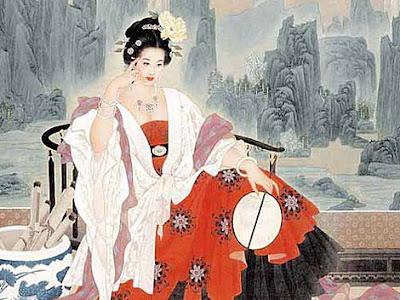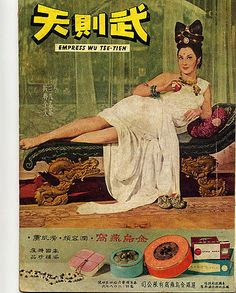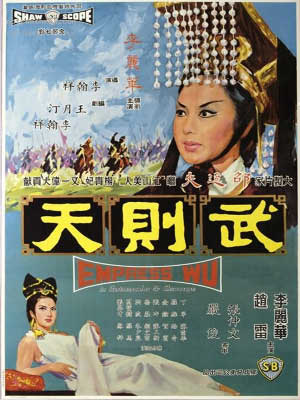Trying to cover the life of Empress Wu in
a movie is like trying to fill a tea cup with the ocean. It just can't be
done try as director Li Han-hsiang attempts in this Shaw costume epic. Empress
Wu aka Wu Zetian lived from 624 to 705 A.D during the Tang Dynasty and ruled
China though born a commoner for forty years. First through her husband the
Emperor, who was sickly and uninterested; then through her two sons who she
dominated and then for fifteen years on her own. It was a remarkable life
of her rise to power through wile, determination and ruthlessness and then
holding on to it. A woman. A former concubine. There were constantly conspiracies
and rebellions to overthrow her and they all failed till near the end when
illness and age weakened her. And even then she was treated with respect.
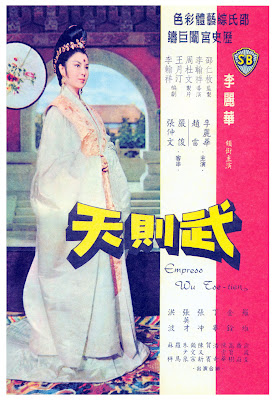
Historians opine that this was a great period for China - they expanded their
borders dramatically, corruption in the Court was reduced, the economy grew
and the arts and education flourished. Not too bad from a woman born to a
well to do family in which the father ran a timber business and encouraged
his daughter to get an education. At fourteen she was chosen to be a courtesan
to Emperor Taizong. When the Emperor died in 1649, Wu Zetian by custom went
to live as a nun in a monastery. That is when the film picks up the story.
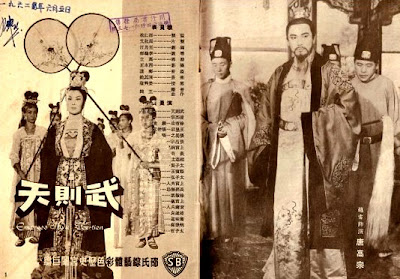
Empress Wang (Diana Chang) the first wife to Emperor Tang Kao Sung (Chao
Lei) is concerned that the Emperor is paying too much attention to one of
his courtesans and so takes Wu Zetian out of the monastery and brings her
to the Imperial Palace (by the way set in Xi'an) in hopes that this will
take his attention away from the other woman. She unfortunately succeeds
in this but his attraction to Wu - remember his father's concubine - grows
quickly. And she begins to gain influence over him and his increasing sickness
takes away his interest in ruling. Wu quietly begins accumulating power,
killing rivals (goodbye Diana Chang) and installing people loyal to her.
The film raises the same question as did Hero (2002) - if a leader rules
absolutely and with brutality but does it for the good of the people and
the stability of the country, is that acceptable. Is that in fact a moral
obligation. It is a question that China has always wrestled with to this
day. The answer in the film seems to be yes.
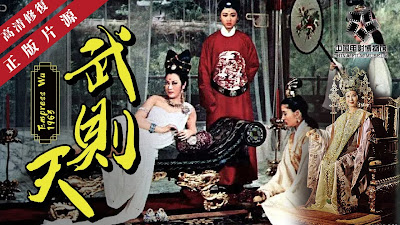
Like all of Li Han-hsiang's early period films for Shaw, it is lavish with
beautiful sets, costumes, extras and lots of actors. Look for many of the
Shaw regulars - King Hu is the traitor that she forgives and he then saves
her later, Lo Wei is Minister Pei who leads a rebellion against her, Yan
Jun was the Minister who tells her off, Ding Ling is the young woman that
she takes on as her assistant, Kao Pao-shu is Ding Ling's mother but the
film is completely driven by the performance of Li Li-hua as Empress Wu.
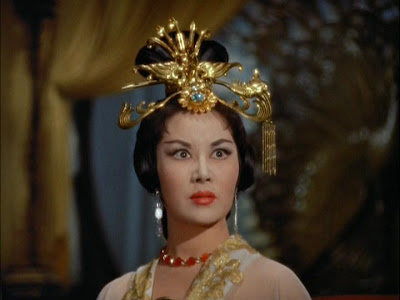
She is a legend of course - born in Shanghai to a Chinese Opera performer
and then studying it herself and when she was sixteen she was in her first
film. Later she moved to Hong Kong and was a star in many films in the 1950s
and joined Shaw in the early 1960s appearing in a number of the period classics.
She is great in this - demanding your attention - both being hard and soft.
The film though suffers from trying to cover too much and never giving enough
time to various sub-plots. It skids along the big points in her life. Characters
come and go like traffic. It also has a few historical errors - not that
any one would know unless they read up on her. But her two sons who betrayed
her didn't actually exist. The ending is also played for phony drama. There
have been numerous TV series about her life which is how you would have to
do it. Some of you may have come across a portrayal of her in the Detective
Dee films as played by Carina Lau. You would need a hundred episodes to do
her life justice.
